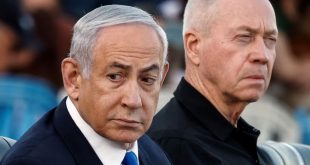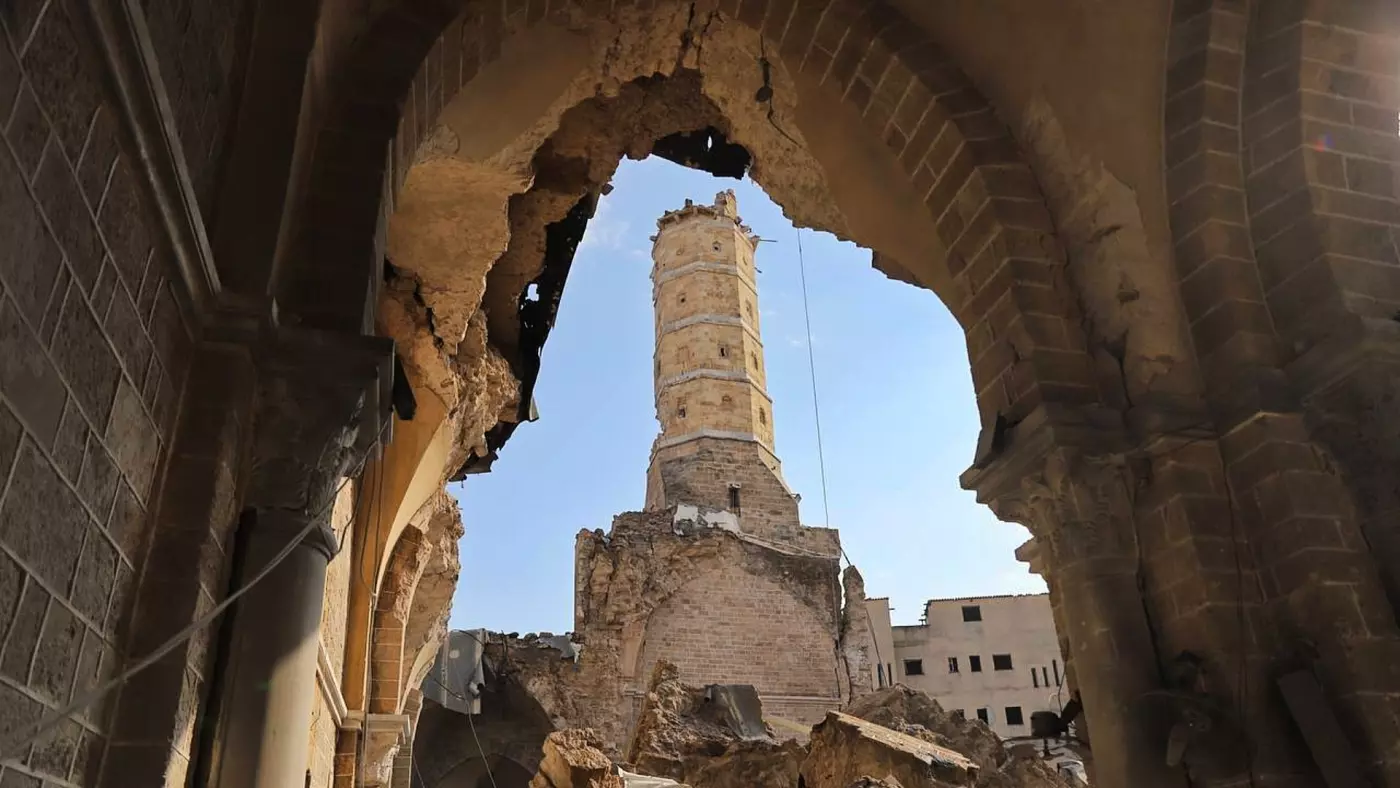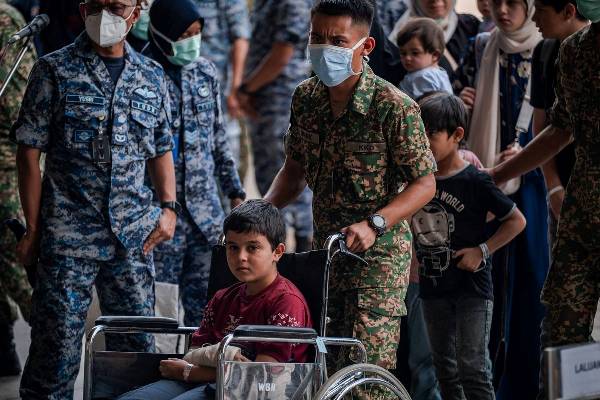Internally displaced Palestinians from the Gaza Strip, looking for safety are camped in the grounds of the al-Nasser hospital in Khan Yunis in the southern Gaza Strip yesterday. AFP.
It has now been more than a month since Israel unleashed its military juggernaut against Gaza’s civilians in response to the October 7 attack by Hamas fighters on Israeli military and
civilian targets.
Some 1,400 Israeli civilians and troops died in the Hamas attack and subsequent Israeli military operation to kill or capture Hamas fighters. The appalling pictures the Israeli military released to the media and what we see from Gaza daily in the media were heartbreaking.
Children and civilians, whether they are Israelis or Palestinians, need to be protected at all times. A war is a war only when it is between combatants. If civilians are targeted, it is a war crime.
International humanitarian laws (IHL) clearly define the conduct of a war. ‘Jus in Bello’ or the law of the armed conflict, as outlined by the IHL, demands that states fighting a war must protect non-combatants and direct their attacks only at combatants. Civilians must be protected from harm, and unnecessary suffering must be avoided. The force the states resort to must be proportionate. The principles of ‘Jus in Bello’ are enshrined in many international treaties, including the Geneva Conventions and the Hague Conventions.
The move to protect non-combatants in an armed conflict has received a major boost from the UN General Assembly through a 2005 resolution that legitimised the Responsibility to Protect (R2P) doctrine. Just as the UN Charter says it wants to “save succeeding generations from the scourge of war, the R2P doctrine seeks to ensure that the international community never again fails to halt crimes against humanity.
However, since then, the sad development has been the abuse of the doctrine by big powers to invade other countries or intervene and achieve political objectives.
Long before the International Commission on Intervention and State Sovereignty (ICISS) in 2001 called for global recognition of R2P and the United Nations General Assembly endorsed the doctrine in 2005, India dropped food aid in Sri Lanka’s north in June 1987 in violation of Sri Lanka’s sovereignty and justified its action on humanitarian grounds. Throughout Sri Lanka’s civil war, R2P had been a contentious issue.
In a self-assessment, the UN later confessed that it failed to protect the civilians caught up in the war zone at the last stages of the Sri Lankan conflict. Before this, the UN looked helpless when nearly 800,000 people died in the Rwandan genocide in 1994 and also in Bosnia’s Srebrenica in 1995, when the Serbian army killed 8,000 men and
male children.
The Rwandan and Bosnian horrors happened before the R2P doctrine found explicit expression in international law. Now, the doctrine is not an option for whether to intervene and protect civilians in armed conflicts; it is a legal obligation under international law. In 2008, the Global Centre for the Responsibility to Protect (GCR2P) was set up to monitor conflicts where civilian lives are jeopardised.
Weeks before the October 7 Hamas attack, the Centre issued five warnings, drawing the world’s attention to the worsening crisis in Palestine, with a civilian being killed every day in the West Bank by Israeli settlers and troops. After the war erupted in Gaza, the Centre issued a call for international action to protect Gaza civilians, but it got lost in the United States’ loud and immoral support for Israel’s unwillingness to effect a ceasefire.
In terms of the R2P doctrine, read together with the Fourth Geneva Convention, a state has the primary responsibility to protect its citizens and people under its occupation. The doctrine says if the state fails to protect civilians, then it is the responsibility of the international community to take collective action, including the use of force if necessary.
However, the application of this doctrine has been highly controversial and politically loaded. It was during the Darfur conflict that the UN Security Council first invoked the R2P doctrine to form an international peacekeeping force to protect civilians and aid workers. The idea was later dropped.
Then, in 2011, when the Libyan crisis was turning worse, with the West and its Arab allies scheming for the overthrow of Muammar Gaddafi, the UN Security Council adopted Resolution 1973 to impose a no-fly zone ostensibly to protect civilians.
The West and its Arab allies misused the R2P doctrine to bring about regime change when there was no evidence of genocide or mass-scale attacks on civilians in Libya. The civilian casualties in Libya cannot be even remotely compared with the death toll of the carnage Israel is carrying out in Gaza.
Yet the enthusiasm the West showed to invoke the R2P doctrine to protect Libyan and Syrian civilians is absent when it comes to Gaza’s children and civilians. The 11,000 Gaza death toll includes about 4,000-plus children, a figure confirmed by UNICEF.
The UN Secretary-General, Antonio Guterres is powerless and has no legal authority to invoke the R2P doctrine and shake the conscience of the West and its allies, which cover up Israel’s crimes against humanity and prolong the torment of the Gaza civilians.
While the Western leaders who matter fail to take collective action under the R2P doctrine to protect the Gaza children and civilians, it is encouraging, however, to note that the people in the West are raising their voices to protect the Palestinian people who have nowhere to hide from the bombs and missiles Israel is raining on them while depriving them of food, drinking water, medicine, fuel, and other essentials.
The West’s hypocrisy, double standards, and idolatry of Israel are no big surprises, but the inaction of the powerful Arab states is despicably puzzling. True, the R2P is invoked through a UN Security Council resolution, and successive resolutions supported by the Arab states to bring about a humanitarian ceasefire in Gaza have been vetoed by Israel’s all-crimes friend, the United States.
Nevertheless, if the situation becomes dire, any nation can take R2P action without the authorisation of the UN Security Council. So far, only Jordan has taken such action by airdropping essential medicine to Gaza. Qatar is playing a behind-the-scenes role to end the war and work out a deal for the release of hostages in Hamas custody.
Some Arab nations have recalled their envoys from Israel. But this is far from an action under the R2P doctrine. Egypt could invoke the R2P doctrine and fully open the Rafah border, but it fears that its action may fast-track Israel’s policy of ethnically cleansing Gaza and then reoccupying it. The US now says it is opposed to Israel reoccupying the Gaza Strip fully or partially.
The Arab nations also fear that their R2P intervention may trigger a region-wide war or even a world war. This is why Iran and Hezbollah are also holding their fire.
But there is yet another reason: Most Arab states have normalised or are in the process of normalising ties with Israel. They see Israel and the US as their protectors, given their enmity with Iran. So Palestinians are expendables.
Post Disclaimer | Support Us
Support Us
The sailanmuslim.com web site entirely supported by individual donors and well wishers. If you regularly visit this site and wish to show your appreciation, or if you wish to see further development of sailanmuslim.com, please donate us
IMPORTANT : All content hosted on sailanmuslim.com is solely for non-commercial purposes and with the permission of original copyright holders. Any other use of the hosted content, such as for financial gain, requires express approval from the copyright owners.
 Sri lanka Muslims Web Portal Sri Lanka Muslims News Center
Sri lanka Muslims Web Portal Sri Lanka Muslims News Center
 Donate
Donate


